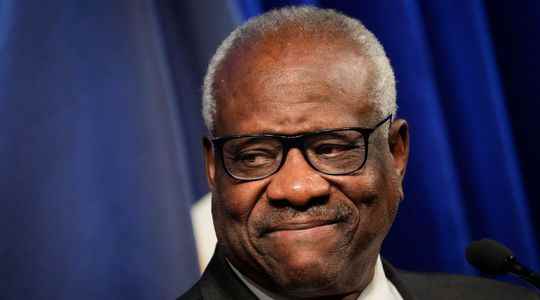Since being named a Supreme Court Justice by President George HW Bush on October 15, 1991, Clarence Thomas has often had to feel alone. Which, for a disciple of political individualism, has nothing infamous about it. In 2004, he was the only one of nine magistrates to consider that the federal government of the United States had the right to detain its nationals in Guantánamo without judicial review. In 2009, he was the only one to believe that the obligation imposed on a 13-year-old girl to undress to carry out a body search is not contrary to the Fourth Amendment, which is supposed to protect citizens from searches and abusive searches. .
And last January, he was the only one to oppose the request to open the presidential archives, as part of the investigation into the assault on the Capitol on January 6, 2021, thus supporting the former president. Donald Trump. It should also be noted that his wife, Ginni Thomas, has multiplied the interventions with elected officials or the chief of staff Trump himself, for several months, to try to reverse the result of the American presidential election 2020.
However, on Friday June 24, he must have greatly appreciated that the majority of his colleagues voted, like him, on the ban on abortion at the federal level, offering him by six votes against three the most beautiful birthday present . Because, as a symbol, Clarence Thomas, considered the most conservative judge of the Supreme Court, celebrated his 74th birthday the day before the decision to repeal the Roe v. Wade, instituting since 1973 the right to abortion.
A libertarian converted to conservatism
Born June 23, 1948 in Pin Point, Georgia, Clarence Thomas comes from a black and poor family. His youth was difficult, and the confrontation with racism permanent. Even in a seminary in Missouri, where he had entered to become a priest and where he will not linger. Revolted by the state discrimination suffered by the black community, he threw himself into activism and founded a black union in the college of Sainte-Croix in Massachusetts, run by Jesuits. Active support of the Black Panthers movement, he opposed the policy of the United States, which then cooperated with South Africa despite the apartheid regime. Far from being a Marxist like the theoreticians of the Black Panther Party, the young Thomas claimed to be a libertarian, judging that the only role of institutions should be to protect the freedom of each individual. Thus, according to this philosophy, abortion, euthanasia or even prostitution constitute good measures as long as the individual has the choice to resort to them or not. According to this principle, every libertarian should therefore support Roe v. Wade, since it focuses on the right to privacy of a woman, free to decide whether or not to continue her pregnancy.
But Clarence Thomas has, over time and his readings, evolved towards a conservative individualism, making him hostile to any general social law likely to distort the sacred Constitution of the country, which makes no reference to abortion and which does not therefore does not have to protect this right. And by a subtle philosophical repositioning with great consequences, Clarence Thomas tends to believe that the repeal of a social law gives more freedom to the individual. As if, ultimately, the citizen was freer without the state. If we take the example of abortion, Thomas’ reasoning is as follows: the decision to authorize or prohibit it must be in the hands of the direct representatives of the people, namely the governors of each State. , and not be affiliated with a Constitution adopted in 1789.
Following the repeal of Roe v. Wade, Clarence Thomas expressed the desire to repeal other decrees which, according to him, have nothing to do with the Constitution: the Griswold v. Connecticut of 1965 enshrining the right to contraception, the “Lawrence v. Texas” of 2003 making unconstitutional the laws criminalizing sexual relations between people of the same sex and the judgment “Obergefell v. Hodges” of 2015, authorizing marriage for all . A whole “myriad of rights” and as many “errors”, in the words of the judge, which must be urgently corrected since they are contrary to the original Constitution.
